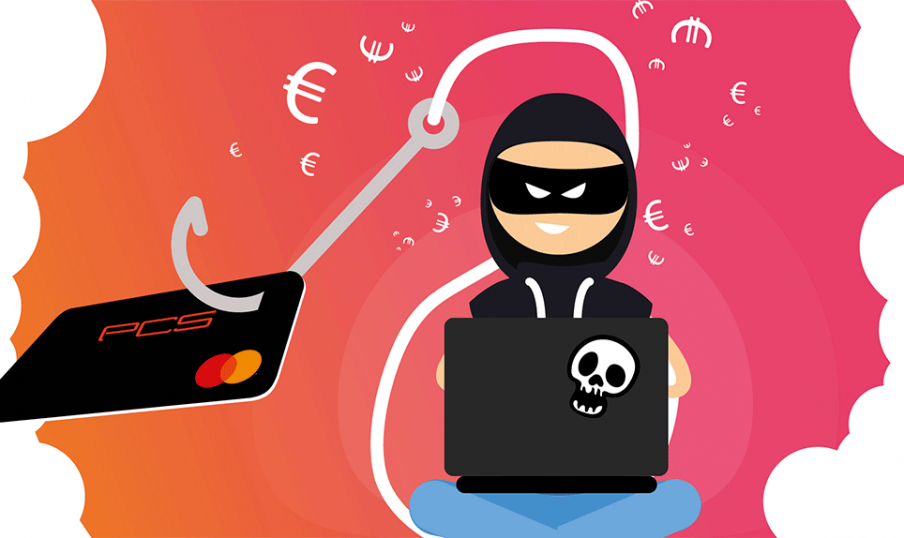

You have received an email from your bank that seems suspicious? You may be a victim of phishing. Stay alert and don’t do anything in a hurry. Fraudsters know how to put pressure in their mail to get what they want. But what exactly is phishing and how can you protect yourself from it? We explain it all to you.
What is phishing?
Phishing what is it?
Phishing is a fraud system on the web that is becoming more and more widespread. Phishing is a scamming technique on the Internet to get information from you. Cybercriminals pretend to be well-known organizations such as your bank, the tax office, the CAF (French social security office) to “phish” you, to lure you into their net.
How do they do this?
They send you a nice e-mail with the name and logo of the company or administration. Everything looks real! There is no reason, a priori, to fear anything. However, in this e-mail, the fraudster will try to obtain personal and especially useful information: your bank details. By bank details, we mean :
- account number ;
- Internet codes ;
- bank card numbers.
How do they formalize their phishing?
The hackers integrate a link or an attachment directly into the email. They will ask you to update your personal information or to confirm certain information following technical incidents in order to obtain your bank details to use them later.
Please note: fraudsters often make spelling, grammar, syntax or typographical errors in their e-mails. With a little vigilance, you can detect most of them and protect yourself from phishing.
How to protect yourself from phishing?
As you have seen, phishing is a well-tried technique that is rather easy for fraudsters. A simple, well-written e-mail and that’s it! But don’t worry, it is also easy for you to foil them. The first thing to know is that no organization will ever ask you for your personal information by e-mail. In any case, here are some rules to follow:
- Never answer the email directly.
- If the e-mail contains a link, do not click on it.
- If you have clicked on it, do not fill in what is asked of you and do not send or validate anything.
- Do not open any attachments.
Your bank details are personal information. Use them only on secure sites and on your personal space. Indeed, this one is protected by your identifiers. It is here that your bank, the CAF or the health insurance can ask you for any information, via a secure messaging system integrated into your personal space. Protecting yourself from phishing is easy if you follow these rules.
Moreover, you can secure your money with reloadable cards. So, if you have given your card information, the fraudster will not be able to take more than what is loaded on it. The advantage of prepaid cards is that you can fill up your card as much as you like, and in the amount you want. To do this, nothing could be simpler, you can get coupons in a tobacconist’s store or in a specialized store. It is also possible to recharge it by transfer! PCS prepaid cards offer you a wide range of choices for very attractive prices. This is a good way to protect yourself from phishing.
What to do in case of phishing?
The CNIL provides simple and precise recommendations on what to do in case of phishing:
- Report the fraud on the website internet-signalement.gouv.fr
- Delete the e-mail and empty the trash.
- If you receive a suspicious email on your professional email account, you transfer it to the IT department or manager who will check it. Wait for his return before deleting the mail.
- For more information: visit the cybermalveillance.gouv.fr website or contact Info Escroqueries at 0 805 805 817 (price of a local call from a landline, €0.06/min from a cell phone) – available from Monday to Friday, from 9 am to 6 pm.
Precautions to take to protect yourself from phishing
As you can see, when in doubt, you are not alone! Just remember these few precautions to take to protect yourself against phishing:
- Never communicate personal information by e-mail.
- Never reply to suspicious e-mails. As a reminder, the bank or the tax authorities will never ask you for information by e-mail.
- Do not be fooled by an attractive e-mail: there is little chance of winning a jackpot or a blender thanks to a simple e-mail!
- Never click on the link in an e-mail indicating that it directs you to the organization’s website. Go to the site yourself.
- Check that the site is secure: it must start with “https://” and not “http://”. You should also see a padlock on the left of the site address or at the bottom of the browser.
- In case of doubt: contact the organization concerned by phone. They will validate or not the risk of phishing.
Everyone can protect themselves from phishing by following these recommendations. However, do not hesitate to consult the offers of reloadable cards that allow you to secure your money.


